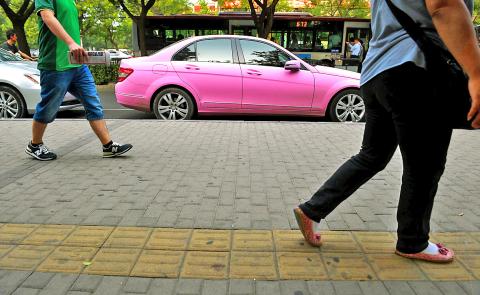China announced yesterday it would fine 12 Japanese auto parts suppliers a total of US$202 million for colluding to raise prices in an unfolding anti-monopoly probe of the country’s auto industry.
Beijing has launched a series of investigations into automakers and technology suppliers under its six-year-old anti-monopoly law, in an apparent effort to force down prices. Officials said earlier that Mercedes-Benz, Audi and Chrysler also violated the law.
The Japanese suppliers were found to have colluded improperly, some for up to 10 years, to raise prices of ball bearings and other parts, according to China’s National Development and Reform Commission.

Photo: AFP
“This harmed the legitimate rights and interests of consumers,” the commission said on its Web site.
PRICE COMPLAINTS
Regulators have given few details of the probe but industry analysts say they might have been motivated by complaints about the high price of imported luxury vehicles and replacement parts.
Two of the Japanese companies, ball bearing makers NSK Ltd and NTN Corp, announced on Tuesday they were among those being fined.
The others were components suppliers Hitachi Ltd, Denso Corp, Aisan Industry Co, Mitsubishi Electric Corp, Mitsuba Corp, Yazaki Corp and Furukawa Corp and bearings makers Nachi-Fujikoshi Corp and JTEKT Corp.
The commission said that the components makers were fined a total of 832 million yuan (US$136 million) and the bearings suppliers 403 million yuan, but it gave no breakdown by company.
COMPETITION LAW
The EU Chamber of Commerce in China, in a statement last week, said competition law should not be used to achieve other goals such as forcing price reductions.
The group said that it received reports regulators pressure companies to accept penalties without a full hearing and avoid involving their governments.
A Chinese Ministry of Commerce spokesman denied this week that foreign companies were treated unfairly.
On Monday, the government said Mercedes Benz was guilty of “vertical price-fixing.” It said the unit of Germany’s Daimler AG used its control over supplies of replacement parts to charge excessive prices.
Officials have said Volkswagen AG’s Audi luxury unit and Fiat Chrysler Automobile NV’s Chrysler would also face unspecified punishment for violating the law. Toyota Motor Co has said its Lexus unit is under scrutiny.
TECH FIRMS PROBED
Regulators also have announced investigations of Qualcomm Inc and Microsoft Corp.
Last year, Chinese regulators fined five foreign dairies and one from Hong Kong a total of US$108 million on charges they violated the anti-monopoly law by setting minimum prices for their distributors.

MULTIFACETED: A task force has analyzed possible scenarios and created responses to assist domestic industries in dealing with US tariffs, the economics minister said The Executive Yuan is tomorrow to announce countermeasures to US President Donald Trump’s planned reciprocal tariffs, although the details of the plan would not be made public until Monday next week, Minister of Economic Affairs J.W. Kuo (郭智輝) said yesterday. The Cabinet established an economic and trade task force in November last year to deal with US trade and tariff related issues, Kuo told reporters outside the legislature in Taipei. The task force has been analyzing and evaluating all kinds of scenarios to identify suitable responses and determine how best to assist domestic industries in managing the effects of Trump’s tariffs, he

TIGHT-LIPPED: UMC said it had no merger plans at the moment, after Nikkei Asia reported that the firm and GlobalFoundries were considering restarting merger talks United Microelectronics Corp (UMC, 聯電), the world’s No. 4 contract chipmaker, yesterday launched a new US$5 billion 12-inch chip factory in Singapore as part of its latest effort to diversify its manufacturing footprint amid growing geopolitical risks. The new factory, adjacent to UMC’s existing Singapore fab in the Pasir Res Wafer Fab Park, is scheduled to enter volume production next year, utilizing mature 22-nanometer and 28-nanometer process technologies, UMC said in a statement. The company plans to invest US$5 billion during the first phase of the new fab, which would have an installed capacity of 30,000 12-inch wafers per month, it said. The

Taiwan’s official purchasing managers’ index (PMI) last month rose 0.2 percentage points to 54.2, in a second consecutive month of expansion, thanks to front-loading demand intended to avoid potential US tariff hikes, the Chung-Hua Institution for Economic Research (CIER, 中華經濟研究院) said yesterday. While short-term demand appeared robust, uncertainties rose due to US President Donald Trump’s unpredictable trade policy, CIER president Lien Hsien-ming (連賢明) told a news conference in Taipei. Taiwan’s economy this year would be characterized by high-level fluctuations and the volatility would be wilder than most expect, Lien said Demand for electronics, particularly semiconductors, continues to benefit from US technology giants’ effort

‘SWASTICAR’: Tesla CEO Elon Musk’s close association with Donald Trump has prompted opponents to brand him a ‘Nazi’ and resulted in a dramatic drop in sales Demonstrators descended on Tesla Inc dealerships across the US, and in Europe and Canada on Saturday to protest company chief Elon Musk, who has amassed extraordinary power as a top adviser to US President Donald Trump. Waving signs with messages such as “Musk is stealing our money” and “Reclaim our country,” the protests largely took place peacefully following fiery episodes of vandalism on Tesla vehicles, dealerships and other facilities in recent weeks that US officials have denounced as terrorism. Hundreds rallied on Saturday outside the Tesla dealership in Manhattan. Some blasted Musk, the world’s richest man, while others demanded the shuttering of his